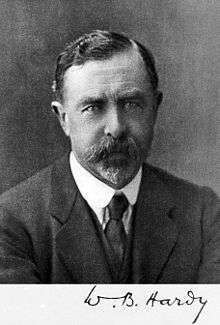William Bate Hardy
Sir William Bate Hardy, FRS[1] (6 April 1864 – 23 January 1934) was a British biologist and food scientist.[2] The William Bate Hardy Prize is named in his honour.

Life
He was born in Erdington, a suburb of Birmingham, the son of William Hardy of Llangollen and his wife Sarah Bate.[3] Educated at Framlingham College, he graduated with a Master of Arts from the University of Cambridge in 1888, where he carried out biochemical research. He first suggested the word hormone to E.H. Starling.
He was elected a Fellow of the Royal Society in June 1902,[4] and delivered their Croonian Lecture in 1905, their Bakerian Lecture (jointly) in 1925 and won their Royal Medal in 1926.[5] Hardy delivered the Guthrie lecture to the Physical Society in 1916.
In 1920 Hardy, in cooperation with Sir Walter Morley Fletcher, the secretary of the Medical Research Committee, persuaded the trustees of the Sir William Dunn legacy to use the money for research in biochemistry and pathology. To this end they funded Professor Sir Frederick Gowland Hopkins (1861–1947) in Cambridge with a sum of £210,000 in 1920 for the advancement of his work in biochemistry. Two years later they endowed Professor Georges Dreyer (1873–1934) of the Oxford University with a sum of £100,000 for research in pathology.[6] The money enabled each of the recipients to establish a chair and sophisticated teaching and research laboratories, the Sir William Dunn Institute of Biochemistry at Cambridge and the Sir William Dunn School of Pathology at Oxford. Between them, the two establishments have yielded ten Nobel Prize winners, including Hopkins, for the discovery of vitamins, and professors Howard Florey and Ernst Chain (Oxford), for their developmental work on penicillin.
Hardy was knighted in 1925 and died in Cambridge in 1934.
Family
He married Alice Mary Finch in Cambridge in 1898.
References
- h., F. G.; s., F. E. (1934). "William Bate Hardy. 1864-1933". Obituary Notices of Fellows of the Royal Society. 1 (3): 326. doi:10.1098/rsbm.1934.0016.
- Rideal, E. K. (1964). "In memoriam. Sir William Bate Hardy, F. R. S., 1864-1964". Transactions of the Faraday Society. 60: 1681–7. doi:10.1039/TF9646001681.
- Biographical Index of Former Fellows of the Royal Society of Edinburgh 1783–2002 (PDF). The Royal Society of Edinburgh. July 2006. ISBN 0 902 198 84 X.
- "Court Circular". The Times (36787). London. 6 June 1902. p. 10.
- "Library and Archive Catalogue". Royal Society. Retrieved 29 December 2010.
- Flanagan. "Sir William Dunn Bt (1833-1912)". Cite journal requires
|journal=(help)